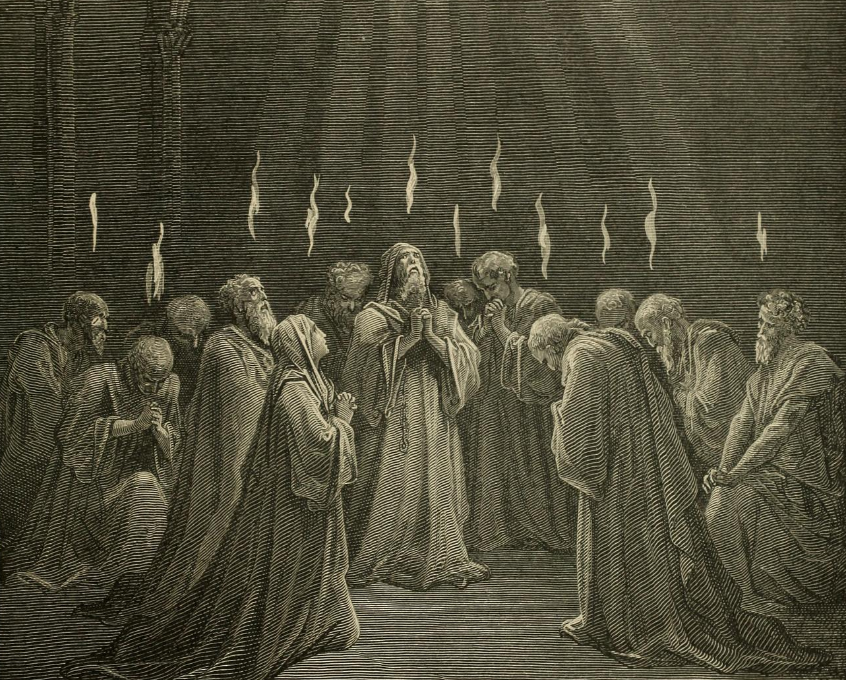These verses are about what is the work of the Holy Spirit based on a chain of verses that are referenced in a specific order to help give clarity and context.* It has very minimal commentary so that you can do your own self-reflection and discovery of the verses. Many times the Bible explains itself if you just know where to look.
With each group of verses, there are probing questions to help you consider what is being said. Each verse in the study is linked to an online Bible, should you want to check the context of the verses around it. Also, allowing verification of what scripture says, as well as purity of a study based only on the Bible.
1. How is the Holy Spirit described?
- Comforter and Spirit of truth. John 15:26 (KJV) — “”
- Power from on high. Luke 24:49 (KJV) — “”
- Holy Ghost and power. Acts 1:5 (KJV) — “”
- Holy Ghost. Luke 3:22 (KJV) — “”
“It is plain from these scriptures that the Holy Spirit is the personal representative of Christ upon the earth, abiding in the church by dwelling in the hearts of the believers. It follows that any attempt to make a man the vicegerent of Christ in the
— “Bible Readings for the Home Circle,” p. 182.
place of the third person of the Godhead, is an attempt to put man
in the place of God. Thus does the fundamental principle of the Papacy set aside the person and work of the Holy Spirit.”
“Cumbered with humanity, Christ could not be in every place personally. Therefore it was for their interest that He should go to the Father, and send the Spirit to be His successor on earth.
— “The Desire of Ages,” p. 669.
No one could then have any advantage because of his location or his personal contact with Christ. By the Spirit the Saviour would be accessible to all. In this sense He would be nearer to them than if He had not ascended on high.”
2. How early in Bible history is the Holy Spirit mentioned?
- Genesis 1:2 (KJV) — “”
3. How is the presence of the Holy Spirit discerned?
- John 3:8 (KJV) — “”
4. What is the specific work of the Holy Spirit?
- John 16:7,8 (KJV) — “”
5. How should man treat the Holy Spirit?
- John 20:22 (KJV) — “”
6. What experiences follow the receiving of the Spirit?
- Confessions follow reproof. 1 John 1:9 (KJV) — “”
- Change of heart called new birth. John 3:5,6 (KJV) — “”
- Led by the Spirit instead of natural desire. Romans 8:13,14 (KJV) — “”
7. What progress is made under His leadership?
- John 16:13 (KJV) — “”
- Proverbs 4:18 (KJV) — “”
8. Should one refuse to follow these greater truths, what happens?
- Ephesians 4:30 (KJV) — “”
9. If rebellion continues, what finally becomes of the Holy Spirit?
- The Spirit ceases striving with the heart. Genesis 6:3, first part (KJV) — “”
- The soul is utterly forsaken of God. Proverbs 1:23-31 (KJV) — “”
“The limit is determined by the creature rather than by the Creator. It is when there is an utter abandonment to evil, and further appeals would be without avail. God, foreknowing all
— “Bible Readings for the Home Circle,” p. 183.
things, may designate a definite period of probation for man, as in the case of the one hundred and twenty years before the flood (Genesis 6:3); but His Spirit never ceases to strive with man as long as there is hope of his salvation.”
10. Where is the mind of the Spirit of God expressed?
- John 6:63 (KJV) — “”
11. When the Word guides, who is leading?
- John 17:17 (KJV) — “”
- 1 John 5:6 (KJV) — “”
12. What will the Spirit teach us?
- John 14:26 (KJV) — “”
13. When He brings these words to our minds, what are we to do?
- John 14:15-16 (KJV) — “”
- John 14:21,23 (KJV) — “”
“There can be no bestowal of the Holy Spirit where there is an unwillingness to obey God in any matter about which He has already made His will known. There are in many lives questions of long standing about which conscience has often been troubled, but with regard to which the heart has been disobedient to the heavenly vision. These are the hindrances which make all prayer for the Spirit’s power noneffective; and until they are willingly dealt with, and the long-deferred obedience yielded, His fulness will never be received. It often happens that when souls are eagerly seeking this blessing from pure motives, there are revealed to them hitherto hidden acts and attitudes of disobedience, sometimes trifling in themselves, and about these points the whole controversy rages.”
— “The Ministry of the Spirit,” pp. 133, 13I.
14. What change will He work in our lives?
- Ezekiel 36:25-27 (KJV) — “”
15. When we lack the disposition to do right, how may we obtain the Spirit’s presence?
- Psalms 51:10-12 (KJV) — “”
16. In what way does the Holy Spirit co-operate with us in our supplication?
- Romans 8:15 (KJV) — “”
- Romans 8:26,27 (KJV) — “”
17. With what will He fill the heart?
- Romans 5:5 (KJV) — “”
- Galatians 5:22 (KJV) — “”
18. Of what does the Holy Spirit bear witness?
- John 16:13,14 (KJV) — “”
19. What promise did Jesus make?
- John 14:16,17 (KJV) — “”
- John 14:26 (KJV) — “”
“A great work will be accomplished in a short time under the final outpouring of the Spirit. Many voices all over the
earth will sound the warning cry. Signs and wonders will be wrought by the believers, and, as at Pentecost, thousands will be converted in a day.“Those who fail to heed this final gospel call, like the unbelieving Jews, will be doomed to destruction. The seven last plagues will overtake them, as war, famine, death, and destruction overtook the Jews, who, not believing In Christ, failed to heed His call to flee, and shut themselves up in Jerusalem to their doom. Those who heed the call, and separate themselves from sin and from sinners,
— “Bible Readings for the Home Circle,” p. 198.
will be saved.”
This study guide was based on Reading No. 28, pages 136-137 from Brief Bible Readings for Busy People,
prepared by the Home Missionary Department
of the General Conference of Seventh-day Adventists.
Review and Herald Publishing. Published originally in 1930.
View the original study guide, which this guide is based on, as a scanned PDF. Full credit to them.
*A Bible chain reference is a system of cross-referencing between different passages or verses of the Bible to connect and relate different concepts, themes, or topics mentioned in different parts of the Bible. It helps readers gain a deeper understanding of the overall message and meaning of the text. To use it, readers start with a particular topic or theme and then look up the corresponding list of verses, paying attention to the connections and relationships between them. Studying them in a particular order, helps one understand the topic from beginning to end. Just like peeling the layers off of an onion. It’s a useful tool for anyone looking to deepen their understanding of the Bible and its teachings.


Leave a Reply